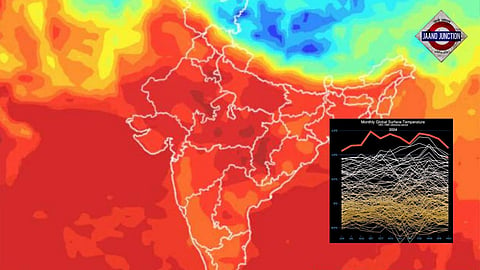

As parts of India continue to reel under the impact of severe heatwave in June continuing from last month, Nasa scientists have revealed that May 2024 was the hottest May on record, marking an unprecedented full year of record-high monthly temperatures globally.
According to researchers from NASA's Goddard Institute for Space Studies (GISS), average global temperatures for the past 12 months hit new highs for each respective month – an unparalleled streak.
"It's clear we are facing a climate crisis," stated NASA Administrator Bill Nelson. "Communities across America — like Arizona, California, Nevada — and communities across the globe are feeling first-hand extreme heat in unprecedented numbers. NASA and the Biden-Harris Administration recognise the urgency of protecting our home planet. We are providing critical climate data to better lives and livelihoods, and benefit all humanity."
This run of record temperatures aligns with a long-term warming trend driven primarily by human-caused greenhouse gas emissions. The trend has become evident over the past four decades, with the last 10 consecutive years being the warmest since record-keeping began in the late 19th century.
Before this 12-month streak, the previous longest streak of record monthly temperatures lasted seven months between 2015 and 2016.
"We're experiencing more hot days, more hot months, more hot years," said Kate Calvin, NASA's chief scientist and senior climate advisor. "We know that these increases in temperature are driven by our greenhouse gas emissions and are impacting people and ecosystems around the world."
In NASA's analysis, a temperature baseline is defined by several decades or more, typically 30 years. The average global temperature over the past 12 months was 2.34 degrees Fahrenheit (1.30 degrees Celsius) above the 20th century baseline (1951 to 1980). This is slightly over the 2.69 degree Fahrenheit (1.5 degree Celsius) level with respect to the late 19th century average.
NASA scientists gather data from tens of thousands of meteorological stations on land and instruments on ships and buoys to calculate Earth's global temperature. This raw data is analyzed using methods that account for factors like the varied spacing of temperature stations and urban heating effects.
Natural phenomena like El Niño and La Nina, which warm and cool the tropical Pacific Ocean, can contribute to year-to-year variability in global temperatures. The strong El Niño that began in spring 2023 helped fuel last year's extreme summer and fall heat.
As of May 2024, NOAA projected a 49% chance of La Nina developing between June and August, and a 69% chance between July and September. A La Niña event could partially
suppress average global temperatures this year by cooling the tropical Pacific.
A sluggish southwest monsoon on Wednesday covered large parts of Maharashtra, awaiting a fresh pulse to march across central and northern India, which continued to reel under intense heat conditions.
Heatwave conditions were observed on Wednesday in most parts of Punjab, Haryana, Chandigarh, Delhi, Uttar Pradesh, Jharkhand; in many parts of north Rajasthan; in some parts of Himachal Pradesh, south Bihar, north Odisha and in isolated pockets of Gangetic West Bengal.
Severe heatwave conditions were also observed in isolated pockets of Uttarakhand, Himachal Pradesh, Punjab, Jharkhand and Gangetic West Bengal. The maximum temperatures were in the range of 45-47 degrees Celsius over some parts of west Jharkhand, south Uttar Pradesh, Haryana-Chandigarh-Delhi, Punjab, north Rajasthan.
